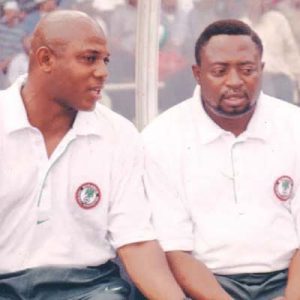
You deliberately do all to commit to memory some names, faces, events, data and the like but somehow the brain fails to deliver such information when needed leading to a below par result after an examination or outright embarrassment. Funnily, the same memory keeps some things indelible even when you make no attempt to store it. The news of the death of Stephen Keshi and later Amodu Shuaibu typified those events that exposed the ironies of the human brain. Everyone remembers what or where he or she was doing or was when the news broke.
Mine was not too spectacular but was as well indelible. Beginning with Keshi’s, it was a June 8 dawn that my wife woke me up to put on the generator so that she could iron her clothes. I reluctantly got up from the bed to do her bidding. I immediately put on the television, plugged my phone, laptop and rechargeable lamps to the power sources while my wife went to iron her clothes. Just then, on the scroll bar on the television screen was the breaking news that Stephen Keshi was dead. In doubt, I changed the channel for confirmation but was still bewildered that I put off the generator, told my wife I couldn’t believe it, said our morning prayers and saw her off to work. I returned home to put on the radio and all the morning sports shows confirmed the sad news.
Still living in denial of Keshi’s death three days later on Saturday, I woke up by 7am to wish my mother a happy birthday on the phone, after which I put on the radio on my handset only to hear the demise of Amodu. I went dumb and confused on what kind of calamity befell us as a nation in quick succession. Honestly, their deaths were, to me, like that of a friend despite never having any physical contact with them.
Talks have filled the airwaves on how best to immortalise these legends. They really deserve to be immortalised because of their imponderable sacrifices and patriotism.
Beginning with Coach Amodu Shuaibu: He had come to national limelight after leading BCC Lions of Gboko to win the then African Cup Winners’ Cup in 1990. He had earlier coached clubs in the Nigerian domestic league such as Shooting Stars of Ibadan and El Kanemi Warriors of Maiduguri. He also had a successful stint with Orlando Pirates of South Africa. However, he is most remembered for managing Nigeria’s national football team, the Super Eagles. He was first entrusted with the team in the mid-nineties, when the Super Eagles was at its peak. The Eagles were African champions and had attained its loftiest ranking by FIFA.
At the turn of the millennium, Amodu was repeatedly called upon to manage the Super Eagles, especially when the team had recorded series of mediocre results and were almost out of qualifying for major tournaments like the World Cup. Amodu would always salvage the situation by unbelievably qualifying the Eagles but was always frustrated out of the job by the football authorities. Disallowing him from consummating his efforts by taking the team to the 2002 and 2010 World Cups after hard-earned qualifications readily comes to mind. Whether taking Nigeria to the semifinals of the African Cup of Nations or qualifying for the World Cup, it must be noted that Amodu Shuaibu never failed to meet the targets set for him.
Despite these feats, Amodu was unfortunately the symbol of how indigenous coaches are disrespected and shabbily treated in contrast to the over-pampered expatriates. So, in immortalizing the Edo-born tactician, all entitlements owed him should be paid by the football body and the Edo State government to his family first.
Afterwards, the welfare of Nigerian coaches must be taken seriously. I suggest an Amodu Law. This law, which would be passed by the National Assembly, would make it unlawful for indigenous coaches to have discriminating packages and treatment in comparison to their foreign counterparts. Asking for equal pay may not be practicable considering it is a competitive market that calls for signing of legally binding contracts reflecting the potentiality of the individual; however, the Amodu Law when passed would protect the Nigerian coach from uneven labour treatment like making them to handle national teams without signing concrete contracts with them as Salisu Yusuf is doing presently with the Super Eagles. It should also be crafted in such a way that a foreigner can only man the Eagles’ bench only after local coaches have been given right of first refusal while a local coach must, by this Amodu Law, compulsorily be a deputy to a foreign coach .
For multilingual Stephen Keshi, not immortalizing him would do great injustice to him. Keshi bridged the then Green Eagles generation and the now Super Eagles. He was the one that paved the way for Nigerian footballers to professionalise their trade from the local amateur player to the Europe-based international. He is best remembered as the longest serving skipper of the national football team wearing the captain’s band for about a decade earning him the nickname, The Big Boss.
He captained the golden age of the Eagles culminating in its 1994 annus mirabilis becoming African champions, giving a respectable outing in its debut World Cup in USA and attaining Nigeria’s highest fifth position on the FIFA rankings.
SUN
END

Be the first to comment